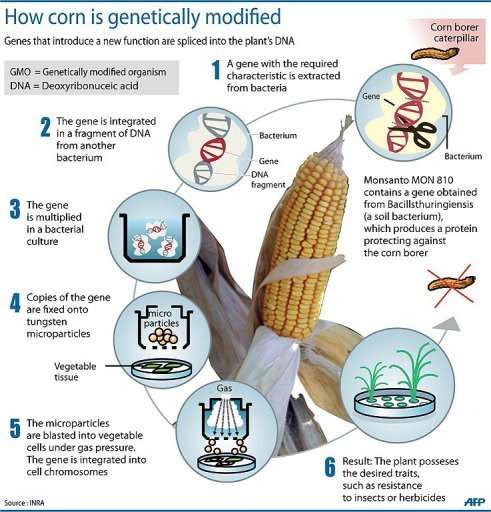Panels reject study on GM corn but urge wider probes (Update 3)

Two expert panels on Monday rejected a contested French study linking genetically-modified corn to tumours in rats but said it raised issues which deserved wider investigation.
Asked by the government to deliver a fast-track verdict, two groups of specialists reported they found no evidence to back what the study said.
The Higher Biotechnologies Council (HCB) and the National Agency for Food Safety (ANSES) declared they saw nothing to challenge existing safety assessments for Monsanto's NK603 corn or its Roundup weed killer, which was part of the experiment.
"The study provides no scientific information regarding the detection of any health risk linked to NK603 corn, whether it was treated with Roundup or not," said the 66-member HCB, set up in 2009 to provide an independent view.
"The data are insufficient to establish scientifically a causal link... or to support the conclusions or pathways suggested by the authors," ANSES said separately.
But both called for a broader investigation to guide a public left rattled or confused by the debate.
The HCB said the inquiry should look into whether NK603 had long-term impacts on health, while ANSES urged a probe into any consequences of combined exposure to NK603 and Roundup.
In response, the French government said it would ask the European Union to "overhaul" its procedures for vetting GM crops and pesticides in the light of ANSES' proposal.
"In this context, the government reaffirms its determination to maintain France's moratorium on GM crops" authorised for cultivation in the EU, it said.
The storm was unleashed in September by researchers led by Gilles-Eric Seralini at the University of Caen in Normandy, who said rats fed with the genetically-modified corn and/or doses of Roundup developed tumours.

The paper unleashed a storm in environmentally-sensitive Europe, where GM crops face many restrictions.
NK603 has been engineered to make it resistant to Roundup, so that farmers can douse fields with the Monsanto weed killer in a single go, offering savings.
Roundup was launched in 1970 by Monsanto and it became the most used weed killer in the United States. Its producers say its toxicity is limited in comparison with other herbicides.
Seralini said his experiment was the first to test GM corn on rodents' normal life span of two years, as opposed to the standard 90 days. He said NK603 and Roundup both caused tumours, whether they were consumed together or on their own.
But critics faulted the experimental methods and data and accused him of manipulating the media to gain scary headlines.
In an exceptional move, six French science academies on Friday branded the work as flawed and said it had "spread fear among the public".
Among reactions, Seralini said he welcomed a wider investigation but said that in the meantime, NK603 should be banned.
"A two-year study takes four years to set up and analyse, and during these four years, who else is going to fall sick or die because of these poorly-tested products?" he told AFP in a phone interview.
Monsanto said at its French headquarters in Lyon that "it took note" of the HCB's findings and said the recommended probe "does not change risk assessments" for NK603.
Environmental group Greenpeace said Seralini had exposed a gap in testing transgenic products for their long-term impact on health and the environment.
"No suitable, universally agreed protocol for carrying out such long term tests currently exists," Janet Cotter of Greenpeace International's science unit told AFP in an email.
"Even then, such tests will not address the broader environmental and social implications," she said.
The European Food Safety Agency (EFSA), which reviews use and authorisation of GM organisms, has rejected the Seralini report as "inadequate;" its final judgement is expected in "the coming weeks," the agency said on Monday.
Watchdogs in Germany and Australia and New Zealand have also said the study offered no firm evidence of risk.
Seralini is a well-known opponent of GM food.
But his paper appeared in the journal, Food and Chemical Toxicology, which uses the peer-review process, a system designed to ensure published research is accurate and fair.
(c) 2012 AFP


















